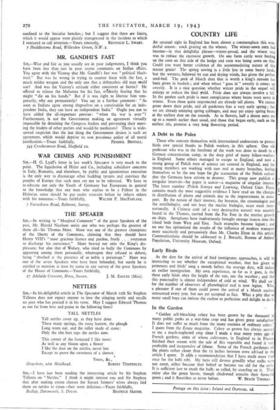MR. GANDHI'S FAST
SIR,—Wise and fair as you usually are in your judgements, I think you have been less than just in your recent comments on Indian affairs. You agree with the Viceroy that Mr. Gandhi's fast was " political black- Mail." But was he wrong in trying to counter force with the fast, a much milder weapon and the only one that a defenceless old man could use? And was the Viceroy's attitude either consistent or heroic? He offered to release the Mahatma for his fast, evcdently fearing that he might " die on his hands." But if it was right to liberate him tem- porarily, why not permanently? You say in a further comment: "As soon as Indians agree among themselves on a constitution for an inde- pendent India, they can have an independent India." Ought you not to have added the all-important proviso: " when the war is over "? Furthermore, is not the Government making an agreement virtually impossible by detaining the Congress leaders and preventing their meet- ing the leaders of other parties and would-be mediators? There is wide- spread suspicion that the last thing the Government desires is such an agreement, which would deprive its non posstimus policy of all moral justification.—Yours faithfully, PENDRIL BENTALL. 543 Crookesmoor Road, Sheffield zo.


























 Previous page
Previous page